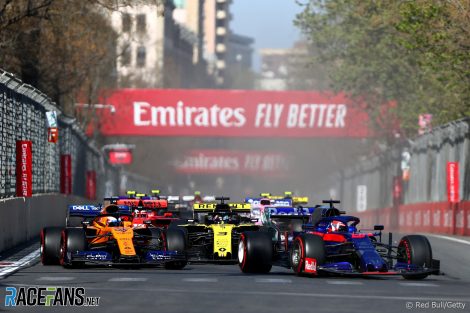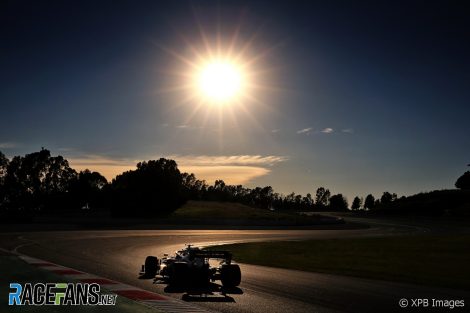Since returning humbled from their Melbourne fiasco, Formula 1 and its 10 teams have been locked in discussions in attempts to minimise the havoc that the pathogen known as Covid-19 has wreaked. The ways of the world are such that good grows from bad, and the sport is aiming to emerge stronger from this enforced period of character-building.
The signs are that during Thursday’s conference call of all major players the good of the sport was put ahead of individual agendas. All agreed to defer 2021’s much-vaunted technical regulation changes – the product of years of work – and to permit F1 to negotiate a revised calendar without the need for their implicit approval as required by the regulations.It seems a new-found humility has transmuted into a willingness to learn, as is evident from the number of conference calls between teams since they returned from Australia. One team member – who requested anonymity on account of a rare silence pact that prevails amongst the FIA, F1 and the teams – said: “I’ve not had as many conversations with other teams in a year as I’ve had this week.”
During these calls numerous ideas, concepts and proposals flowed. Covid-19 has disrupted F1 more than anything else in its 70-year existence, forcing it into the harsh realisation that it does not (and cannot) exist in a ‘paddock bubble’.

Formula 1 therefore has to walk a difficult line between being reactive without falling prey to the kind of destructive, knee-jerk impulses it has too often in the recent past.
Encouragingly, yesterday signalled that in the face of this crisis the selfish horse-trading and constant tabling of individual agendas is being set aside. For these factors, more than any others, bred the regulatory lethargy that F1 currently labours under.
The FIA and commercial rights holder Liberty Media will find themselves under intense pressure from teams, promoters, broadcasters, suppliers and sponsors, all of whom are desperate for urgent answers. But some of the solutions which have been floated have clear shortcomings.
Advert | Become a RaceFans supporter and
Despite the “silence” pact, various ideas have been leaked to the media. Some would clearly not survive first contact with reality.
For example, while F1 managing director Ross Brawn has pointed out F1 regulations permit events to be run with less than a dozen entries – they state “may be run with less than 12 cars” – race promoters are contractually promised at least 16.

There are currently moves afoot to delay the start of the 2021 season beyond mid-March to enable some postponed events to spill into early next year. But such scheduling is possible only for races in warmer climes. Furthermore, doing so would mean certain events being held twice in a single calendar year – immediately after their promoters have incurred heavy losses due to disruption.
Given that most events are underwritten, partially at least, by public money, one wonders how state organs would react to such plans, particularly given the enormous financial toll Covid-19 has already extracted. It is all very well for F1 to be saying, “We’re going to do this or that…” but the reality is such negotiations are two-way streets.
The potential impact on teams’ contractual obligations also have to be considered. For example, McLaren’s engine deal with Renault expires at the end of 2020, to be replaced by Mercedes. How will they cope with regulations that demand their 2020 chassis be carried over? Then there is Haas, whose technology-sharing contract with Ferrari expires this year.
Indeed, one contact remarked that Ferrari, who initially opposed a chassis carry-over for 2021 before voting in favour, must have a discovered a quick fix for the seemingly duff chassis it used in testing…
Advert | Become a RaceFans supporter and
Consider, too, that F1 has agreed unanimously to delay the introduction of its 2021 technical regulations by a year due to the prevailing situation. While a positive development on the face of it, the regulations form part of a delicately balanced, interdependent ecosystem and just postponing one aspect is likely to have some repercussions.

The word is that the existing annual budget cap level of $175m will be retained. But if the present inequitable revenue and governance structures are kept along with it, will the smaller teams who have been clamouring for change be pushed beyond the brink, particularly given an already-depleted prize money ‘pot’ for this year? That all hinges on the Concorde Agreement being signed as is – a big ask.
In Melbourne F1 was caught flat-footed in response to the developing crisis; this week it showed it can think fast and take hard decisions quickly. But it faces more soul-searching over the coming weeks. Further conference calls are planned, but these are likely to prove only the beginning of an encouraging and earnest pro-active process, rather than their providing a definitive road map for F1’s immediate future.
F1’s new-found humility and willingness to learn notwithstanding, an extremely rocky negotiation period lies ahead for all players, regardless of their goodwill and best intentions. That said, F1 deserves every bit of support for what it has achieved thus far.
Go ad-free for just £1 per month
>> Find out more and sign up
2020 F1 season
- Pictures: Wrecked chassis from Grosjean’s Bahrain fireball crash to go on display
- Bottas vs Rosberg: Hamilton’s Mercedes team mates compared after 78 races each
- F1 revenues fell by $877 million in Covid-struck 2020 season
- Hamilton and Mercedes finally announce new deal for 2021 season
- F1 audience figures “strong” in 2020 despite dip in television viewers





Olivier
20th March 2020, 7:31
Spread the 2020 season over two years, like in Formula E. Start the season in Spa in 2020, and end the season in Hungary in 2021. This way teams have plenty of time on working on the radical new car for the 2022 season.
Phylyp (@phylyp)
20th March 2020, 8:12
This is a reasonable suggestion in a lot of ways, and I’ve seen many people put forth compelling arguments in favour of it.
One drawback I see that might need addressing is that by spreading one season over two calendar years, it also results in spreading one season’s revenues over two years. Unless that is addressed somehow, it will mean that Liberty receives less from race promoters & broadcasters, and in turn disburses less to the teams and their shareholders.
That’s the reason I’d see Liberty and the teams aiming for a shortened 2020 season instead, if the pandemic permits resumption of events by a Jun/Jul/Aug timeframe, so as to allow them to hit the ~15 races that broadcasters expect.
ColdFly (@)
20th March 2020, 9:50
| spreading one season’s revenues over two years
Get more races in in both years; aim for 30-35 over the two calendar years.
And bonus points for every 100 respirators produced.
Phylyp (@phylyp)
20th March 2020, 10:01
@coldfly – by bringing in additional venues, or by visiting some venues twice (my God, on top of shortened race weekends is it going to be the coronavirus that gives Liberty a free pass to try out reverse grids in one of those two visits?!)? I’m not sure we have enough F1-grade venues for such a number, but we could hit that number if we add on some venues and visit some venues twice (imagine Hamilton losing at Silverstone the first time, or Max and Zandvoort, that’ll sell out the tickets for the second go-around).
If it involves addidtional venues, then it could be a good way of switching to a model from 2022 onwards where we don’t have every GP/venue every single year, and instead have biennial races at some.
ColdFly (@)
20th March 2020, 11:07
Why reverse grid?
I’ll as my lawyer if the FIA grading prescribes racing in a certain direction, @phylyp.
Phylyp (@phylyp)
20th March 2020, 16:15
@coldfly – not sure if you’re joking here… while the idea of race in the reverse direction is definitely interesting (and is very popular in racing games), I’m not sure if the safety barriers and other safety features are oriented for cars running in the opposite direction in most tracks.
For instance, openings in barriers for recovery vehicles are positioned such that they cannot be accessed by a car running in the normal direction, but becomes a directly open pathway for cars running the other way (and worse still, the barrier that is closer to the track becomes a major hazard.
Likewise, other safety features like runoffs might also not work as intended the other way around.
ColdFly (@)
20th March 2020, 16:22
Not even sure myself. It started as lighthearted sarcasm (you know me by now), but it might have some merit.
Maybe the extra safety measures are less expensive than upgrading an existing circuit.
And less run-offs can only be seen as a plus; just add some gravel.
@phylyp
Olivier
20th March 2020, 10:23
Good point. After the December shutdown for the holiday season, they could continue the 2020/2021 season with new race venues in January and February. These additional races could offset some of the losses.
Sensord4notbeingafanboi (@peartree)
20th March 2020, 7:43
Fair assumption since the decision to postpone the rules was unanimous. That said I think such decision could have deep repercussions. I can see how it could help smaller teams but I also can see how top teams may benefit.
Are teams the sport? Are they the same thing? This change helps sustain the teams but it may take away from the sport, the new cars aren’t supposed to be new, they are supposed to propel the sport forward, solve a lot of the problems with the sport.
Finally it is so hard to survive in f1. Teams won’t ever put the good of anyone ahead of themselves, this suits everyone.
ColdFly (@)
20th March 2020, 9:45
Of course Covid-19 is not a pathogen, but rather the disease itself.
‘Coronavirus’ would be the pathogen.
Patrick (@paeschli)
20th March 2020, 16:59
SARS-CoV-2 is the virus.
COVID-19 is the disease.
Only Facts!
20th March 2020, 9:58
It takes a catastrophe to bring out the best of people. Maybe this thing will help erasing the last remaining Bernie’s way of doing business that was the norm before, so Liberty can finally take the wheel.
Everything was settled with a one to one trade before. You vote for me, I’ll give you more $, you commit for 5 more years and I will get you an engine, things like that.
This time is either we agree on something or everyone will suffer. And… they agreed!
McLaren situation will be interesting. Haas may decide to stay one more year. But Racing Point is the one with most to loose. It will be hard to develop that W10 chassis even more than Mercedes already have done last year, so in reality they’ll be racing a two year old chassis in 2021. They’ve seen that before. Not good.
Pinak Ghosh (@pinakghosh)
20th March 2020, 10:17
Wonder what will happen to the Netflix series
Only Facts!
20th March 2020, 11:01
Wonder how Hamilton braid his hair? Want to see Grosjean cooking? What about watching Vettel spinning (the bike, not the car…)
Don’t miss Do not drive and survive coming February 2020!
RB13
20th March 2020, 12:02
It will probably end up better than last year’s effort because they left a LOT of big stories out completely. Less races mean less for them to miss out.
ColdFly (@)
20th March 2020, 15:25
Maybe the stories you wanted to see where left our due to lack of availability. Also don’t expect the series to be a full (or even fully accurate) reflection of the on-track racing.
The whole idea is to link the various players and various behind the scenes stories with some on-track action. IMO they did an extremely good job. But then again I’m known to be a ‘glass half full’ fan.
I, for one, will use these weeks to revisit both series.
Not George
21st March 2020, 9:05
I think I’ll watch “Fast & Loud” on discovery instead. The Netflix series sounds like embodiment of the expression that F1 is only a sport for 2 hours on a Sunday afternoon.
I might get round to watching series 1 soon, which reminds me of the (paraphrased) quote from the critics of “The Life of Brian”: dreadful film, never saw it.
LEMAYIAN (@lems)
20th March 2020, 17:25
There are going top be tough decisions for all concerned in F1 to make and I just hope that amid all these, common sense and good judgement will prevail. It’ll get worse before it gets better and the collective good for all parties needs to overshadow the self interest if individual parties. I am no expert in matters F1 but as a medic the SARS-CoV-2 virus is the most disruptive pandemic the world has ever seen, it’s an infection which has caused unprecedented stretching of medical resources in terms of personnel, medication and equipment. It has brought massive downturns in economic output, social disruption unlike anything before and is testing human endurance in the face of uncertainty and calamity to the absolute limit. It’s not just F1, but if we all do something to combat this thing, we will end it as fast as it has spread. This is the time to put aside our differences for the common good of all humanity.
LEMAYIAN (@lems)
20th March 2020, 17:31
Sorry for the grammatical errors,I hope the points are home nevertheless.
Stephen Crowsen (@drycrust)
21st March 2020, 8:36
Yes, everyone needs to contribute in trying to resolve this problem. It is easy to think that if we miss the 18 months to make a vaccine then the consequences won’t be too bad. Unfortunately, based upon the current infection accumulation and deaths, we don’t have 18 moths to figures this problem out.